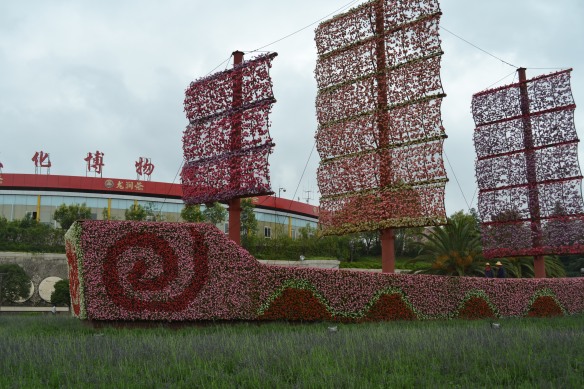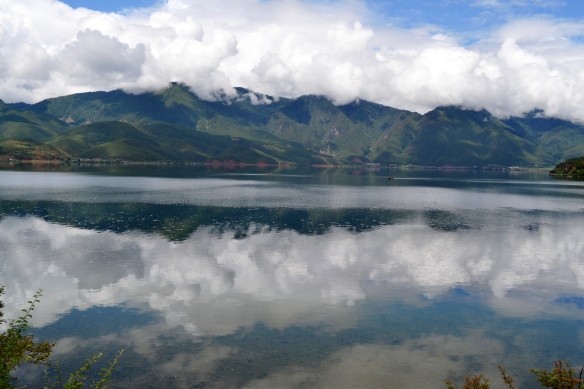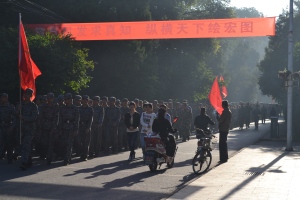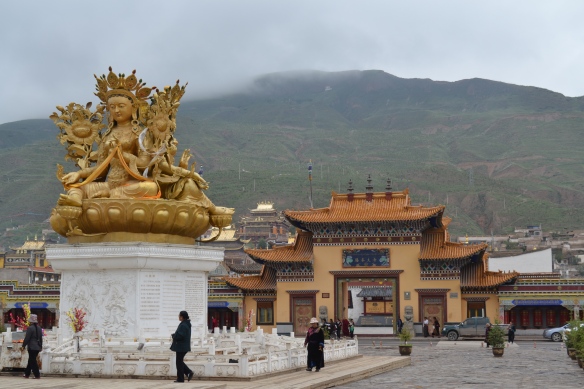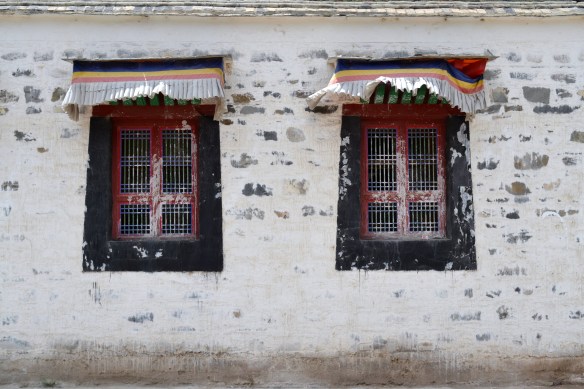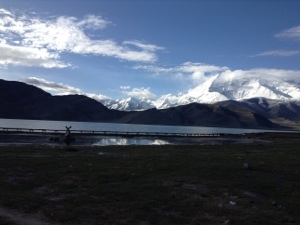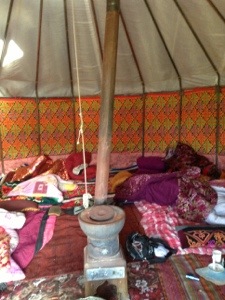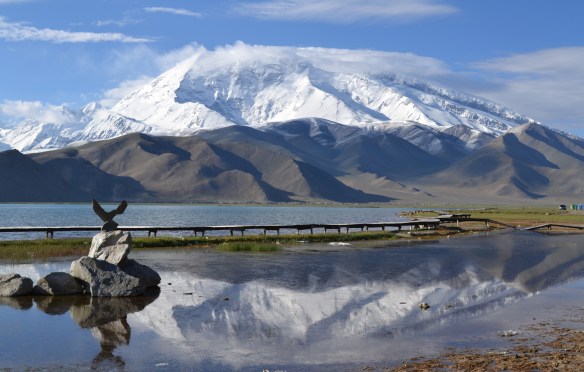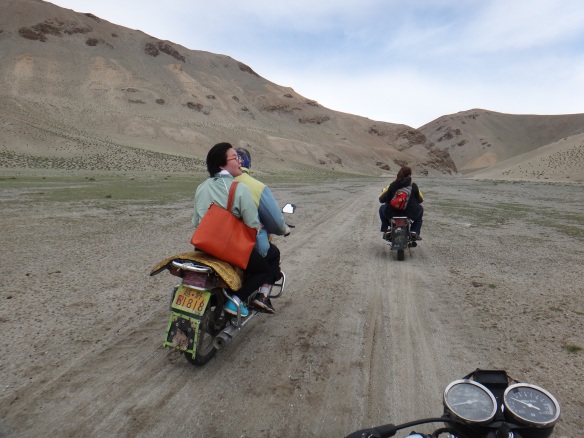I wrote this as my final narrative for my job. Part of it is taken from another blog post I wrote much earlier, She Doesn’t Understand You, but it continues from there.
It can be difficult to see whether I’ve left any sort of mark here in Taigu. I’d like at the very least for my students to appreciate the diversity of the American experience, that freedom in the classroom actually means freedom of expression rather than freedom to show up late holding a milk tea, and to feel a little less nervous about speaking English at the end of the year. I would also like for them to appreciate that foreigners like me are more similar to them than different and probably shouldn’t be treated like aliens or zoo animals. These goals are pretty much impossible for me to measure without spying on them and hoping to catch them talking to a foreigner that isn’t me– exceedingly unlikely—and so I simply hope that I’ve had an effect on them.
This is perhaps the reason why after two years here, the person who made me feel the most successful was not one of my students, but instead a shop girl.

At least once a day I take the six minute walk to the bustling commercial center of campus, Beiyuan. The vendors I frequent all know me and what I want. The jianbing man knows I want extra lettuce, the sour spicy soup woman knows I don’t want it spicy, and the iced tea girls know I’ll be buying an extra for Johnny. In addition to the food and drink vendors, Beiyuan is home to many almost identical convenience shops, three of which I go to regularly. Despite each of them being about the size of an Oberlin single, they carry everything from toilet paper to school supplies to mittens to Oreos, all jammed onto shelves and spilling out the door.

One day during my first year in Taigu, I found myself with a dire need for some tacks, and I headed to my favorite shop. The owner spends most of his day listening to the government-controlled news on the radio and often springs questions on me like, “Do Americans believe Obama when he says that the unemployment rate is 8% or do they think he is lying? And if the unemployment rate is going down, do the people really feel it or is it just a statistic?”
His questions often eventually drive me into a corner where I can no longer understand him due to all the advanced vocabulary, but it’s an interesting exchange for both of us. One evening I showed up late enough that he was eating dinner and drinking baijiu (Chinese liquor) with the milkman who tries to teach me the local dialect. Because I was with Johnny, the men invited us to sit down, eat their dinner, drink some moonshine, and tell them all about our backgrounds and understandings of American politics. These interactions had garnered a deep loyalty in me for this particular shop, despite the fact that they had recently raised the price of Coke Zero.
Not long into the year, the boss hired a new girl to help with the store, and she never asked me any questions at all, choosing instead to ogle me like I was a fish who had learned to tap dance.
The day I found myself requiring tacks, both the boss and the new girl were in the store, the one smoking a cigarette on a camp stool and the other puttering around with inventory. I looked around for tacks in the tiny school supply section but couldn’t find any. The new girl had started following me when I walked into the store, but I had been successfully ignoring her. I hadn’t brought my dictionary or had the foresight to look up the Chinese word for ‘tack’ earlier, so it was time to play a guessing game with the boss.
I approached him and said, “I’m looking for something to help me stick one thing to another thing.”
He sprung into action, jumping off his stool and grabbing different sticking devices, holding them up for my approval.
“No, not glue. I want…” I scrounged for something a tack could do that glue or staples could not. “I want to stick a piece of paper to the wall.”
“What? What do you want it for?”
At this point the new girl started talking from behind my back. “Why are you talking to her? She doesn’t understand you. She doesn’t understand you!”
I raised my voice. “I want to stick a piece of paper to the wall.”
She raised her voice. “She doesn’t speak Chinese!”
The boss seemed to understand what I wanted. “Oh, a tack. Here’s a box of metal ones.” He showed me a box of very tiny nails.
“She doesn’t understand you!!”
“Oh, do you have any plastic ones instead?”
At this point, the new girl decided she needed a new tactic, and in English started yelling, “Hello! Hello! Hello! Hello!”
“No, we only have metal ones.”
The barrage of greetings continued into my back. “Hello! Hello! Hello! Hello!”
“Oh, forget it then.” Without turning around to acknowledge the idiocy behind me, I left the store, tackless, frustrated, and deciding that I had just made a new enemy.
To my dismay, the owner of the store spent his time there less and less frequently, and the shop girl was often the only worker there. Correspondingly, I took my business elsewhere for a while.
Eventually I felt bad for denying the shop my business simply because of one silly girl, so I forgave the shop girl for her antics and returned to purchase some sunflower seeds. Normally the only people I see in these stores are students, but that day there were a few people who looked like farmers. While I was grabbing the seeds, the shop girl looked knowingly at one of them, nodded at me and coolly said, “foreigner.”
I decided to play stupid. I put on a blank face and said, “Foreigner? Where?”
She avoided my gaze and said, as if disinterested, “Aren’t you a foreigner?”
I looked myself over in shock. “I never imagined it!”
She wasn’t buying it. “You told me you’re American.”
I wasn’t getting a smile out of her, so I broke character then and said lamely, “Oh, yeah.”
At this point things deviated from the norm. One of the farmers, an older man standing next to me, turned and said, “She isn’t one of ours?”
I repeated to him that I’m American, and he studied my face hard, still not believing me. “Really? But you speak Chinese, you must be Chinese! Are you really American?”
Here I was with the shop girl who had believed couldn’t speak Chinese based on my looks despite hearing me have a conversation, and now for the first time in my life someone assumed I was Chinese based on my language ability despite my looks. I had never been so pleased in the last year as when I told him, “Some Americans can speak Chinese, too!”
After that happy episode, I resumed visiting her store. She would occasionally tell me that she had seen me elsewhere doing other things, and I would nod because I do go elsewhere and do other things. She would also sometimes ask me how to say things in English, and when I would oblige, she would shake her head at the impossibility of it all.
One day I decided to ask her her name. She told me her name was BaiYing, and when I told her my name was GeLan, she protested that she wanted my English name. I made her practice saying “Claire” until it was less than three syllables, and I went on my way.
About a week later, I popped back into the store, and I quizzed BaiYing on my name. She sheepishly mumbled something that sounded tolerably like my name, and I gave her a big smile. She then said, “Your Chinese name is GeLan, right?” I nodded. “That’s not a very good name.” I don’t understand much about Chinese names, so this sounded plausible. “My teacher gave it to me. What should my name be?”
She smiled. “BaiYing.”
“That’s your name! What should my name be?”
She repeated, “BaiYing.”
“You want us to have the same name?”
She nodded vigorously. I told her I would think about it.
Now that we were friends, I visited her shop more frequently. Once the weather became tolerable, she spent most of the day outside manning the ice cream freezer. I wasn’t planning on a conversation with her that day, but she stopped me.
“I noticed that students look at you.”
After two years here, that was an understatement that didn’t warrant a response. I grunted an affirmative.
“They often say things about you.”
Another grunt.
“I think they shouldn’t say things about you. I think that you are a person and people shouldn’t say things about you.”
This was a thought I’ve had pretty much any time I was not holed up in my room, and BaiYing was the last person I expected to hear this from.
“I don’t like it when they say things about me,” I responded, “Especially when they laugh.”
BaiYing nodded. “If I hear them talk about you, I’m going to tell them to stop. They shouldn’t do that.”
I was at a loss. Every time I had mentioned to a person here that I didn’t like how people looked at me, pointed at me, took pictures of me, laughed at me, or talked about me like I couldn’t hear, the response had been defensiveness, telling me how they were just curious, or uneducated, or maybe I misunderstood them. And while I understand that embarrassment of being called out on inappropriate behavior, repeatedly being told that my feelings were uncalled for on the matter had exhausted me. I had accepted that this was something I could not change no matter what I said or did.
But I had been wrong. BaiYing had changed. Eventually I nodded to BaiYing, said thank you, and left.
I hadn’t set out to teach BaiYing anything. In fact, when I failed to buy tacks that first day, I had written her off as someone not worth talking to. But after two years of simple interactions with me, watching me buy things and talk to friends and teach, she stopped seeing me as a curiosity, an other, and started seeing me as a person who, like other people, doesn’t like it when people talk about her. BaiYing, more than anyone else in China, let me know that I have had an effect on the people I live with, teach, and learn from.
Now that I’m leaving Taigu, BaiYing asked me for my address and a picture of myself. I have no idea what she’s planning on mailing me, but I snapped a photo of her as well.



